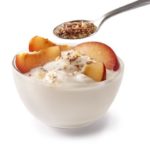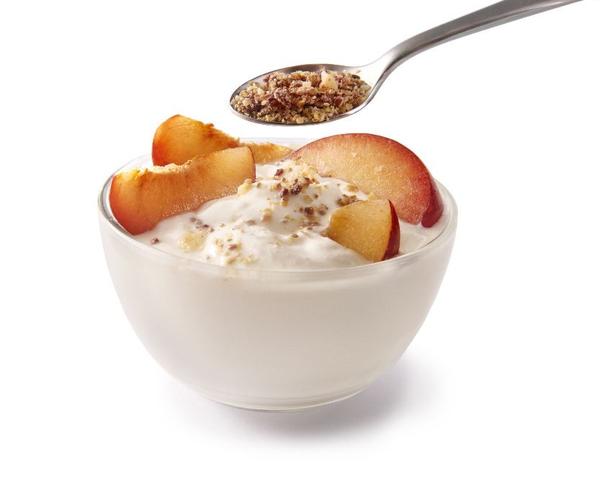Seventy million Americans are eligible to take cholesterol-lowering statins. Yet as many as 20% of outpatients receiving HMG-CoA reductase inhibitors (statins) experience treatment reluctance because of side effects. This leaves a large population at increased risk of cardiovascular disease (CVD). One solution is foods to reduce LDL-C. A study, presented at the American Heart Association Conference in Chicago, showed that swapping two food choices per day can be an effective heart-healthy medicine, even without any other diet or lifestyle changes.
The researchers, from Rochester, Minnesota and Winnepeg, Manitoba, hypothesized that a practical food-based approach could be utilized to lower LDL-C in statin reluctant patients and that the lipid response can be predicted based upon CYP7A1-rs3808607 (CYP7A1) and APOE genetic isoforms. This first-of-its kind, randomized, double-blind, free-living, cross-over study, was composed of two four-week phases, with four-week washouts in between. Serum LDL levels were measured before and after each food intervention.
Statin intolerant/unwilling participants were given an assortment of individually packaged, shelf-stable snacks – ranging from bars to smoothies – with instructions to eat two per day as a substitute for similar items they were already eating. The commercially available intervention snacks, provided by Step One Foods, are made from whole grains, nuts, seeds and fruits as well as plant sterols, and are formulated specifically to deliver clinically meaningful levels of whole-food fiber, omega 3 fatty acids and antioxidants.
Treatment products supplied at least 1800 mg alpha-linoleic acid (ALA), 5 g of fiber and 1g of  phytosterols per serving. The control products were best-selling, calorie-matched “better for you” like-items commonly found in the grocery store. Participants were asked not to change anything else in their daily routines or diets.
phytosterols per serving. The control products were best-selling, calorie-matched “better for you” like-items commonly found in the grocery store. Participants were asked not to change anything else in their daily routines or diets.
Results / As many as 2/3 of participants had a positive cholesterol response to the intervention foods. See the presentation poster at the end of this post for complete details.
- Across all participants, LDL cholesterol reduction averaged 9 percent in the intervention group.
- But if only those with a positive response were considered, that drop was 15 percent on average, with some subjects achieving nearly 37 percent LDL reductions (statin-level effects).
- No significant change was seen in HDL-C, TG or fasting glucose levels.
- LDL-C was reduced by diet in CYP7A1 T/T homozygotes (-0.3924+0.1271mmol/l, p = 0.0033) and APOE4 carriers ( -0.3808+0.098 mmol/l, p = 0.0003).
- Consumption of control products resulted in no improvements in lipid parameters.
If you can achieve this with food, why would you ever use a drug, especially for primary prevention,” asks Elizabeth Klodas, MD, FACC, developer of the intervention products. “
The significance of this study is that participants did not record the food they consumed, nor were they in a lab being monitored. “This trial was done in the real world. Participants weren’t in a lab with someone watching them eat every morsel of food. They were given a box of individually wrapped snacks and told to eat whatever they wanted twice a day. Then come back in 30 days to have their blood re-tested,” said one of the principal investigators Peter J. Jones, Ph.D., director of Richardson Centre for Functional Foods and Nutraceuticals at the University of Manitoba. He adds, “It takes 30 days to see if you’ll respond. Even if you don’t, you will have spent a month eating foods that are simply good for you.”
This is literally as straightforward as take this pill twice per day. Participants were asked NOT to change anything else about their lifestyles. So, no yoga or dietary overhauls were required for many participants to experience medication-level lipid lowering effects,” said Dr. Klodas.
 “Diet is now the number one risk factor for early disease and early death, ahead of high blood pressure, smoking and diabetes. We tend to forget that food is a bioactive substance. I tell my patients everything they put into their mouths either builds health or promotes disease,” says Dr. Klodas. “And it makes a big difference if you just tip the scale a little bit in your favor.”
“Diet is now the number one risk factor for early disease and early death, ahead of high blood pressure, smoking and diabetes. We tend to forget that food is a bioactive substance. I tell my patients everything they put into their mouths either builds health or promotes disease,” says Dr. Klodas. “And it makes a big difference if you just tip the scale a little bit in your favor.”
She adds, “Large studies have shown that even if you lower your cholesterol with a statin, but if you don’t also eat properly, you may not have a significant reduction in your risk of a heart attack or stroke. However, she also points out that most patients are confused about what it means to eat properly, noting “Polls have shown repeatedly that people think it’s easier to do their taxes than to know how to eat healthy. Which is why this approach is so novel. The two grab-and-go food swaps are easy and the ‘eat properly’ bit is built in.”
Conclusion / Significant LDL-C reductions can be affected through a simple food intervention supplying high levels of phytosterols, fiber and ALA. CYP7A1 and APOE isoforms influence the variability in LDL-C response and can help identify individual patients especially appropriate for a food-based LDL-C lowering approach. Given the large number of patients unable/unwilling to take statins, the findings have significant impact for management of this challenging population.
Source: American Heart Association Presentation, Scientific Sessions, Nov. 2018, Washington, D.C. Sa1293 / 1293 – LDL-C Response to Portfolio Foods Containing High Levels of Phytosterols, Whole Food Fiber, and Alpha-Linoleic Acid in Statin Reluctant Patients: Impact of CYP7A1-rs3808607 and APOE Isoforms
Click Here for Poster Presentation
 Dr. Klodas has dedicated her career to preventive cardiology, and to helping her patients reduce their reliance on prescription medications and achieve long-lasting health improvements through dietary change. Trained at Mayo Clinic and Johns Hopkins, she serves as the Chief Medical Officer for Step One Foods. Dr. Klodas is a nationally sought out speaker and has an active role at the American College of Cardiology.
Dr. Klodas has dedicated her career to preventive cardiology, and to helping her patients reduce their reliance on prescription medications and achieve long-lasting health improvements through dietary change. Trained at Mayo Clinic and Johns Hopkins, she serves as the Chief Medical Officer for Step One Foods. Dr. Klodas is a nationally sought out speaker and has an active role at the American College of Cardiology.
Her clinical interests include prevention of heart disease and non-invasive cardiac imaging and she has published dozens of scientific articles throughout her career. She has also authored a book for patients, “Slay the Giant: The Power of Prevention in Defeating Heart Disease,” and served as founding Editor-in-Chief of the patient education effort of the American College of Cardiology. In addition to her practice and her duties at Step One Foods, she also serves as medical editor for webMD.
 Peter J.H. Jones, Canada Research Chair in Functional Foods and Nutrition, joined University of Manitoba on November 1, 2005 as Director of Richardson Centre for Functional Foods and Nutraceuticals. Dr. Jones was awarded Distinguished Professor in Human Nutritional Sciences, Agriculture and Foods Sciences, as well as Food Science, Agriculture & Food Sciences at the University of Manitoba in 2016. Dr. Jones’ main appointment is in the Department of Food Science with a cross-appointment in Human Nutritional Sciences.
Peter J.H. Jones, Canada Research Chair in Functional Foods and Nutrition, joined University of Manitoba on November 1, 2005 as Director of Richardson Centre for Functional Foods and Nutraceuticals. Dr. Jones was awarded Distinguished Professor in Human Nutritional Sciences, Agriculture and Foods Sciences, as well as Food Science, Agriculture & Food Sciences at the University of Manitoba in 2016. Dr. Jones’ main appointment is in the Department of Food Science with a cross-appointment in Human Nutritional Sciences.
A native of Vancouver, BC, Dr. Jones received a BSc degree in Biochemistry at the University of British Columbia. He obtained an MSc in Human Nutrition at the same institution before completing a PhD in Nutritional Biochemistry from the University of Toronto in 1985. After two years with the Clinical Nutrition Research Center at the University of Chicago as a Medical Research Council of Canada post-doctoral fellow, Dr. Jones spent several years on faculty with the Division of Human Nutrition at the University of British Columbia. Dr. Jones was Director of the School of Dietetics and Human Nutrition at McGill University from 1994-99; in addition to being a professor and holding a cross-appointment in the Dept. of Medicine until 2005.
Dr. Jones serves as Past-President of the Danone Institute for Nutrition in Canada and is a Past-President of the Canadian Society for Nutritional Science. Has served as Chairman of the Functional Foods and Nutraceuticals Board of Vancouver-based Forbes Medi-tech group and sat on the Food and Agriculture Organization of the United Nations, World Health Organization, and United Nations University (FAO/WHO/UNU) Expert Consultant Panel for Energy and Protein Requirements in Human Nutrition. Dr. Jones has served on multiple board of directors and committees including SNPitty Inc, Danone Institute of Canada, Heart & Stroke Foundation of Canada, Soy Nutrition Institute Board, Enterprise Machine Intelligence Dr. Jones received the Distinguished Nutrition Leadership Award with Danone Institute of Canada in 2016, Jiri Frohlich Award in 2014, McHenry Award Distinguished Service in Nutrition in 2011 and Young Investigator Award for Excellence in Nutrition research in 1997.and Learning Initiative (EMILI), Health Innovation Platform–Canada (HIP-Canada) and TerraVia Inc. Dr. Jones serves on national grant review committees including Canadian Institutes of Health Research (CIHR)





